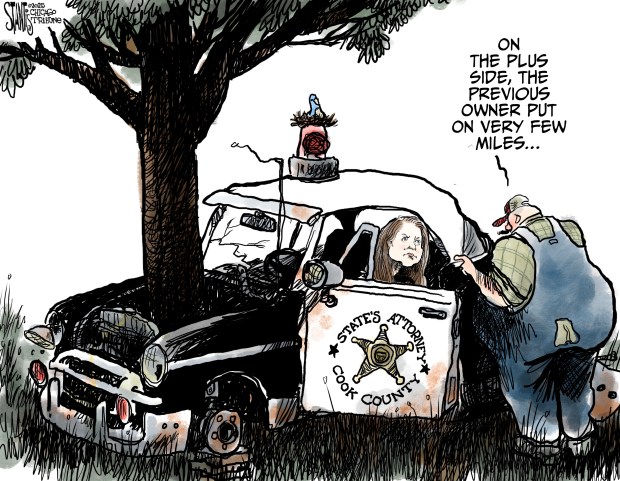The view from the pulpit provides a unique perspective. While we faith leaders see the larger picture of societal problems such as the plague of gun violence, we also see the individuals who are affected and who make a difference in these important issues. This Sunday, as our mayor and the City Council are working toward establishing an Office of Gun Violence Reduction to play a permanent role in combating violence, we want to introduce readers to two people who are representative of the hard work, and of the promise, that community violence intervention (CVI) brings to our city.
Torrence “Pipe” Jordan leads the West Side outreach team for Chicago CRED, calls himself a peacekeeper and describes his work as being very intentional about working directly with the young men and women at highest risk of getting shot or shooting someone.
“We are in the trenches, on the block, in the drug houses; we are the boots on the ground and the first line of defense” is how Jordan explained the CVI work of connecting with individuals to interrupt cycles of violence before they spin out of control. That means trying to prevent people from escalating conflict and also interrupting serious conflicts.
“Before the crime happens and after it happens, you’ll see Chicago CRED,” Jordan said.
Jordan sees his former self reflected in those he works with in the streets.
“I’m a victim of gun violence,” he said. “I got shot in 1998, I was a part of the same streets that these people came from. I ended up losing my leg from complications of the surgery related to that gunshot.”
It was that series of events that motivated Jordan to get involved in CVI work.
“I come from a violent neighborhood. I saw my friends and their children getting killed. I saw it on the news and felt helpless,” Jordan said.
UCAN Chicago, a social services organization, reached out to Jordan to engage in CVI work because he was already informally brokering peace in the community. After he finished his physical therapy, he sat with UCAN representatives and decided to take on the challenge. “I was already a peacekeeper without knowing I was a peacekeeper,” he explains.
Yolanda Fields, executive director of Breakthrough Urban Ministries in West Garfield Park, also knows violence intimately.
“I personally became acquainted with the work because of my own history with violence in my own community and in my family,” Fields said.
Fields shared the story of her younger brother who was sentenced to life in prison for homicide, which made violence real for her family, knowing someone who was be a perpetrator of such a horrible act.
“That made me inquisitive of how we can think and respond as individuals and communities,” Fields said, and led her to explore the roots of the violent culture in which we live.
Fields’ reflections steered her toward solutions.
“When we think about solutions to violence, they are not unattached to all the other things: health, employment, quality education, access to recreation and safe spaces, and more,” Fields said.
This brought Fields to her initial engagement with Breakthrough, which provides a host of resources in the community, ranging from housing and economic development to education and wellness. She knows many people think of gun violence as a stand-alone issue but argues that “violence is a symptom of all the other issues related to disinvestment.” Thus, when a Chicago organization, Communities Partnering 4 Peace, contacted Fields seven years ago, she knew joining this citywide collective was a major part of any peaceful path forward.
It is faith — both in a higher power and human potential — that grounds both of them.
“I really want to be the hands and feet of Jesus,” Fields said. She grew up in St. Louis, in what the neighborhood called the Kool-Aid House, where her family of modest means ministered to “the least of these” by always having a sandwich and Kool-Aid for anyone in need. For Fields, CVI work is a tangible demonstration of her faith.
Jordan feels as if “the most high” put him in this position of being a peacekeeper. Losing a limb and working through rehab, he often argued with God: “Why me? Why me?” Begging to die, feeling sorry for himself and angry at the world, Jordan had a vision in which God answered him: “Why not you? Why not you as the person to step into the role of making peace?”
Jordan sees his work in religious terms: “This is my redemption to make amends for the wrongs I was part of in the 1990s.”
Rooted in faith and acting in the present, Fields and Jordan have specific dreams for the future.
Fields’ dream for Chicago in the next 10 years is that communities look more equitable. “For me, that means that the same opportunities that exist in Lincoln Park exist in Garfield Park” is how she describes a time when ZIP code no longer limits potential pathways nor determines risk of gun violence.
Jordan’s ideal future is based on experiences of his youth, when he felt kids could play in the streets and go to every community. Today, he feels, kids can’t go in either their front or back yard without fear of being shot. “My dream? That children will be able to come out and play,” he said.
These dreams, this important work, are what community violence intervention looks like in Chicago. Now is the time for the entirety of the city — including City Hall — to come together to support and sustain these vital efforts.
Chicago faith leaders Rabbi Seth Limmer, the Rev. Otis Moss III, the Rev. Ciera Bates-Chamberlain and the Rev. Michael Pfleger joined the Tribune’s opinion section in summer 2022 for a series of columns on potential solutions to Chicago’s chronic gun violence problem. The column continues on an occasional basis.
Submit a letter, of no more than 400 words, to the editor here or email letters@chicagotribune.com.



